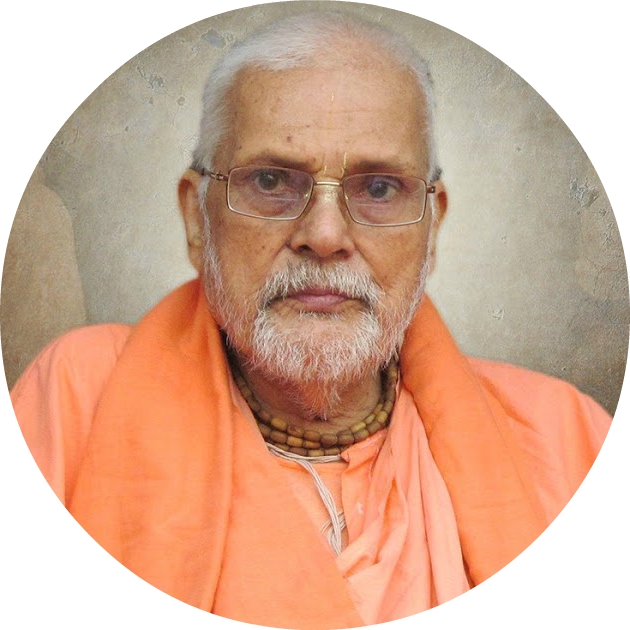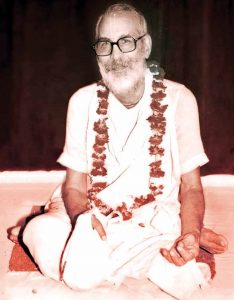
Devotee 1: One devotee was recalling there was so much of a joking mood, so much love and affection between the Vaiṣṇavas earlier [late seventies]. Now there is a new style [type] of brahmacārīs – they are in their rooms, hiding like prisoners. There is a new style in the Gauḍīya Maṭha.
Śrīla Bhakti Vijñāna Bhāratī Mahārāja: The reason is, people are very much inclined towards bhoga, sense gratification because their orientation has changed from a service mood to a mood of kāma [lust] – ātmendriya priti vānchā.
Śrīpāda Dāmodara Mahārāja: Self-centered activities.
Śrīla Bhakti Vijñāna Bhāratī Mahārāja: Previously there were God-centered activities. All these brahmacārīs and sannyāsīs tried to serve others, not taking any service from anybody. But [now] they want to be served. So there is so much difference between the earlier days and the present.
You read my article from the Harmonist?
Devotee 1: We can’t read Hindi.
Śrīla Bhakti Vijñāna Bhāratī Mahārāja: It is in English. They have recently published it in the Vyāsa-pūjā edition.
Devotee 1: Now it is on purebhakti.com also, the whole thing.
Devotee 2: I have to read it.
Śrīla Bhakti Vijñāna Bhāratī Mahārāja: Pūjyapāda Nārāyaṇa Mahārāja once invited me to attend a festival at Śrī Keśava-jī Gauḍīya Maṭha in Mathurā in observance of the disappearance day of Śrī Śrīmad Bhakti Prajñāna Keśava Gosvāmī Mahārāja. After the glories of Śrīla Keśava Gosvāmī Mahārāja were spoken, all the Vaiṣṇavas sat together to honour prasāda, but Pūjyapāda Nārāyaṇa Mahārāja wanted to wait until everyone had been served to their satisfaction before he himself honoured prasāda.
He asked me to sit, but I told him, “No. I will wait, so that we can honour prasāda together.” After all the assembled Vaiṣṇavas finished honouring their prasāda and got up from their seats, we sat down to honour prasāda in Pūjyapāda Nārāyaṇa Mahārāja’s room. Just as we were about to honour prasāda, one disciple of Śrīla Prabhupāda, Śrī Śrīmad Bhakti Prapanna Dāmodara Gosvāmī Mahārāja, arrived. Upon seeing Śrīla Dāmodara Gosvāmī Mahārāja, Pūjyapāda Nārāyaṇa Mahārāja immediately got up from his seat and said, “Mahārāja, please sit for prasāda.” Śrīla Dāmodara Gosvāmī Mahārāja replied, “I will certainly sit and honour prasāda, but only after taking bath. I will return shortly.”
After he left, Pūjyapāda Nārāyaṇa Mahārāja turned to me and said, “Mahārāja, please honour prasāda now. It will be some time before I honour prasāda.” I replied, “No, no. I will also wait for some time so that we may honour prasāda together.”
In that way, after Śrīla Dāmodara Gosvāmī Mahārāja returned and honoured prasāda, Pūjyapāda Nārāyaṇa Mahārāja and I honoured prasāda together. From that time on, I  always kept this exemplary conduct of Pūjyapāda Nārāyaṇa Mahārāja in my heart. With my own eyes, I observed that the affection he exhibited for the Vaiṣṇavas was extraordinary, and the service attitude he maintained was unparalleled. [Adapted from Viśuddha Caitanya-vāṇī, Volume One]
always kept this exemplary conduct of Pūjyapāda Nārāyaṇa Mahārāja in my heart. With my own eyes, I observed that the affection he exhibited for the Vaiṣṇavas was extraordinary, and the service attitude he maintained was unparalleled. [Adapted from Viśuddha Caitanya-vāṇī, Volume One]
Now the system is not like that.
Śrīla Nārāyaṇa Gosvāmī Mahārāja used to stay in our maṭha [Purī] because there was no suitable room in Nīlācala Gauḍīya Maṭha with an attached bath.
Another time, Pūjyapāda Nārāyaṇa Mahārāja and I attended a festival for the opening of Śrī Śrīmad Bhakti Vaibhava Purī Gosvāmī Mahārāja’s maṭha in Visakhapatnam, and we stayed together in the same room. The festival was attended by many senior Vaiṣṇavas. A number of us had plans to go to Purī after the festival and stay in our Śrī Caitanya Gauḍīya Maṭha. Pūjyapāda Nārāyaṇa Mahārāja mentioned to me, “I also have a desire to go to Purī, but due to the state of my health, the accommodations at our Nīlācala Gauḍīya Maṭha would be uncomfortable for me. Though I would like to go with you, I am unable to do so.”
I immediately told him, “There is no need to worry about such things. Please come with us and stay in our maṭha. We can arrange for whatever accommodations or facilities your health requires.” Hearing this, he became pleased and said, “If that is possible, I will definitely go to Purī with all of you after this festival.” Although my train ticket was reserved and I was set to travel with Śrī Śrīmad Bhakti Pramoda Purī Gosvāmī Mahārāja and other devotees, I started my journey one day before everyone else. Withholding the details, I told everyone that I had to leave early for some special reason. Then, with an unreserved ticket, I departed for Purī. Because there were many devotees staying in our Purī maṭha, it was difficult to get a separate, private room. I thus removed all my luggage from my own room, cleaned it and then shifted to a room without an attached bathroom, keeping my room reserved for Pūjyapāda Nārāyaṇa Mahārāja. I knew that if Mahārāja were to see me clearing out my room for him, he would have been reluctant to stay there, and would have insisted I not shift. It was to avoid such a situation that I departed a day early and, without his knowledge, prepared my room for his arrival so that he could stay there without worry.
[Adapted from Viśuddha Caitanya-vāṇī, Volume One]
And I supplied Navīna-kṛṣṇa with a stove and vegetables for Śrīla Nārāyaṇa Mahārāja’s service and asked him to take everything from the bhāṇḍārī [store keeper] – Yaśodā Prabhu.
[Another instance recalled]
[During parikramā] Guru Mahārāja used to survey everyone enquiring – “I hope you are not undergoing any hardships”. Everyone would be astonished to see Guru Mahārāja going to each and every camp [there used to be 18 camps set up wherever the parikramā party would halt at designated locations like Varsāna, Nandagrāma, Govardhana and so on during the Vraja-maṇḍala parikramā] and inquiring from everyone. Guru Mahārāja would also say, “You will not get the same comfort as your home. To undertake any pilgrimage, one must endure some hardship, but if you are experiencing too much difficulty, then please express it because you don’t have any relatives here. Here, you can only share with the maṭhavāsīs. If anyone is unwell and the maṭhavāsīs do not arrange for their specific diet and medicine, then please inform me.”
The pilgrims replied, “Mahārāja these devotees do everything. Why have you taken so much effort to come here?” Guru Mahārāja responded, “It is my duty. Because the parikramā is being conducted in my name so the responsibility defaults to me. All those who are serving are my representatives, it is my duty to ensure whether they are carrying out their services properly or not.”
One lawyer’s wife, Nihārkaṇā Gānguly, said, “Mahārāja you came all the way from there to here just to cross check! These devotees have made so many arrangements for all my dietary and medical needs. My own children would not arrange so nicely, yet despite this, you have come!” For this reason, people would feel indebted and everyone would remain like one family. After Vraja-maṇḍala parikramā, while departing, people would cry upon reaching the station.
Nowadays will they cry? [Laughingly]
Śrīpāda Dāmodara Mahārāja: Whatever they did, our guru-varga, whether it was organizing parikramās [or other festivals], they did so for [the pleasure of] everyone. It was like their sevā.
Devotee 1: Śrīla Gurudeva (Śrīla Bhaktivedānta Nārāyaṇa Mahārāja) used to say, “Please, when you go home, tell everyone that everything was so good – the prasādam, the accommodations, etc., otherwise how will they [the new devotees] become inspired to come for parikramā if you tell them that you endured so many difficulties.”
Source: www.visuddhacaitanyavani.com








